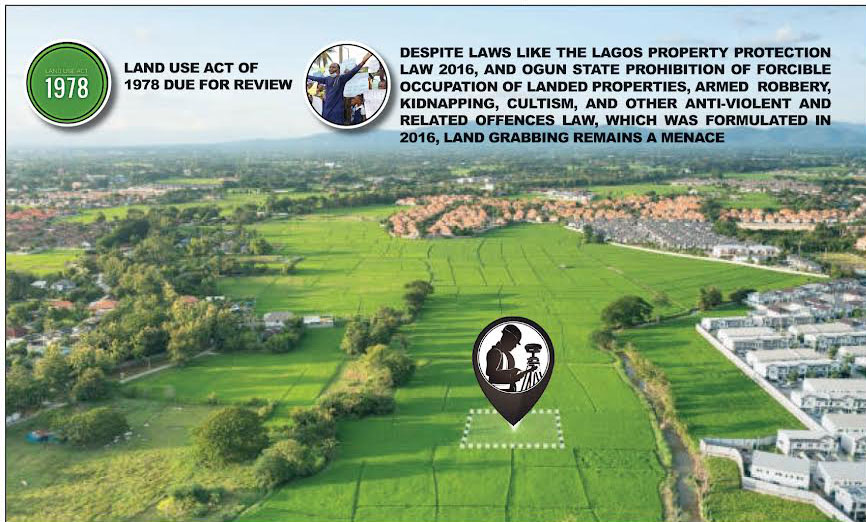
Land is a source of material wealth and tangible resources for human survival. But the activities of land grabbers are largely propelled by increasing urbanisation, industrialisation, greed by individuals and government officials, as well as a high rate of agribusiness expansion nationwide that has made land a scarce commodity. Also, the infamous activities of encroachers and poor governance structure in land administration, alongside ineffective implementation of existing laws, constitute a cog in the wheel of progress in property acquisition. VICTOR GBONEGUN reports that the development has deprived many would-be homeowners of a roof over their heads and potential for investment.
Ten years ago, a cooperative society in a Lagos-based business concern acquired 200 plots of land in the Ikorodu area of the state. Many workers in the outfit, including one Chris Okafor, paid N260,000 per plot. For the subscribers, their excitement was palpable, and the thought of retiring to their houses knew no bounds.
Indeed, the thought of the dream becoming reality someday, made some of them pay for more plots with the hope of developing them later and renting them out to earn income.
The cooperative society went ahead to obtain all the necessary documents and global title to the land. However, many of them could not afford to start developing their plots as their income could barely take them home. So, they worked towards getting mortgage loans or using their pension funds to build the houses.
A few years later, their happiness was cut short, when they discovered that some “prominent” members of the society had taken over the plots of land and resold them to unsuspecting buyers. They also gave the new beneficiaries assurances that there were no issues, nor encumbrances with the plots acquired.
“But before long, it got to a stage that whenever colleagues and I visited the site, social miscreants known as ‘Area boys’ would harass and threaten us with cutlasses. Consequently, I gave up on the land and lost all the investments that I made. I also told myself that I would not die because of plots of land in Lagos. That said, I will never buy a plot of land in Lagos again, instead, I will buy already-built houses when I have the money. However, some of my colleagues repurchased their plots of land at N550,000 per plot, which is almost double the initial cost,” Okafor recalled.
“A particular colleague, who initially bought five plots at N260,000 each, had to repurchase all the five plots at N3.3 million. In the final analysis, about 195 plots worth N50.7 million belonging to my colleagues were lost,” Okafor told The Guardian.
Across the country, many have either been maimed, or killed by land grabbers whose activities are extremely worrisome. The case of one Mr Mustapha in Ogun State, who was a former leader in Ewekoro Local Council is worthy of mention. Miscreants attacked him on his site, gave him the beating of his life, and demanded that he exit the plot of land, which he acquired.
Recounting his ordeal, he said: “I was on my way to my site when a man on a motorcycle with a jumbo cooler on his lap passed beside me on a newly graded road dividing Onigbedu land into two. The man alighted from the motorcycle and began to challenge me. Who are you? Are you not aware that you should not work on this newly graded land?
“He made a phone call and within three minutes about eight thugs on four motorcycles showed up with cutlasses and other dangerous weapons. I was marched out of the site as they beat me blue-black. When they noticed that I could no longer walk due to injuries that I had sustained, I was commanded to climb one of their motorcycles and was driven to the main road,” he recounted.
The story is not different in Anambra State, where the unwholesome activities of touts, who acquire land through unlawful means have remained unchecked resulting in a loss of confidence in real estate investors, hindering infrastructural development, and forcing some investors to ditch the state.
In locations like Nimo, Awka, Aguma Umuoji, Onitsha, as well as Nnewi, over 150 plots of land, each costing between N5 million to N10 million have been grabbed and sold off by miscreants.
Not long ago, land grabbers allegedly stormed Umuoji, a community in Idemili North Local Council, and chased out residents and youths who had gone to inspect their lands with guns and dangerous weapons. Many of the landowners had to protest at the home of the community leader, Silas Onyima, who vowed to intervene on the matter.
For instance, in the Nimo Community, Njikoka Local Council, youths wrote petitions against their leaders whom they accused of sharing a large expanse of the community’s land among themselves.
Narrating their experience, one of the affected persons, Mrs Ebele Okochi said: “Our leaders negotiated with our neighbours – Eziowelle Community – and ceded about 264 plots of land owned by individuals to them, without the consent and knowledge of the owners.” Each plot costs about N500,000.
She said that about 800 women from the community had to storm the Anambra State Police Headquarters, Awka to report the matter to the police command for action before the breakdown of law and order.
Similarly, residents of the Ogwugwu/Umueze Oba community in the Idemili South Local Council of Anambra State protested alleged encroachment on their ancestral land, and the demolition of about 70 houses by alleged land grabbers working in concert with the state government.
The chairman of the community, Chuba Oranusi, said that the community ceded a portion of the land to the Anambra State Government under former Governor Chinwoke Mbadinuju’s administration, who then gave it to a land development firm, Bukham Nigeria Limited, for the construction of a market.
They agreed that the construction firm would not go beyond the boundary given to it by the community. He added that the villagers were compensated with a paltry N72 million out of the N144 million that they were promised.
The Vice Chairman of the community, Emeka Motanya, also said: “Military, police and armed thugs, some of whom are familiar faces have continued to invade and demolish our houses, and when I asked why the demolition, I was beaten and hospitalised for days. The house of our chairman was the first to be demolished.”
Sharing his experience on the menace, the immediate past chairman of the Nigerian Institution of Estate Surveyors and Valuers, Ekiti State Chapter, Dr Sunday Olajide, said: “You can buy the same land from two or three people, but they will still tell you that you didn’t buy it from the right source. In some instances, families will come to say that you didn’t inform them before you bought the land, and you may end up paying four times for a plot of land.”
Even in Guzape II, Federal Capital Territory, Abuja, where a plot of land costs about N50 million, activities of land grabbers are significant. Seven suspects were arrested in the area over land racketeering; they were bent on grabbing three plots of land that did not belong to them.
These and many more are the ugly tales of Nigerians who have fallen victim to land grabbers in several parts of the country, many of whom have only successfully retrieved their plots of land after coughing out double the initial amount that they paid if they are not willing to go to court.
According to Land Matrix, a global think tank, approximately 26.7 million hectares of land have been lost to land grabbing globally since the early 2000s.
With a total land area of 923,769 square kilometres in Nigeria, and an estimated population of 223.8 million by the United Nations, a significant portion of the country’s land has been under the care of land grabbers, even as less than 10 per cent of the land size is titled, paving the way for fraudsters to infiltrate land administration.
The State of the Housing Market Report in Nigeria also revealed that only 23 out of 1,000 people own at least a house. The government through the Land Use Act holds land, while chiefs and local kings hold most of the land.
Many Nigerians both at home and abroad have lost billions of naira in attempts to own plots of land and build houses due to the unfettered activities of land grabbers.
Since the year 2,000 till date, Olajide estimates that about N500 billion worth of land investment may have been lost to land grabbers, who unlawfully acquire people’s land.
The Guardian investigation revealed that out of every 100 cases in court, 10 of them are on land-related issues, especially in Lagos, Ogun, Abuja, Oyo, Anambra, Ekiti, Kano, and Rivers states. Those who approach the courts are just the willing few who dare to do so; others willingly forfeit their plots of land because of the dangerous nature of land grabbers.
A report by a women’s rights group, Kebetkache Women Development, and Resource Centre identified Rivers State as a major breeding ground for land grabbing in Nigeria. Areas like Eleme, Ahoada, Egiland, Egbema regions of Ogba/Egbema/Ndoni local council are worst hit by the menace.
Its Executive Director, Emem Okon, said that land grabbing has an all-encompassing impact on women’s livelihood and forest resource base in the state.
In highbrow areas like Eko Atlantic, Banana Island, and Ikoyi, the land is pricey and a plot goes for as high as over N1.2 billion, and over N500 million respectively, while in locations such as Lekki, Epe, Ibeju-Lekki, Ogudu, Ajah, Lafuwape, Guzape, and others, where activities of land grabbers thrive, a plot averagely goes for N6 million and above. The most expensive one costs N500 million, while the cheapest costs N700,000.
State governments’ interventions
Over the years, land grabbing has become an industry for encroachers and speculators, prompting states like Lagos, Ekiti, and Ogun, to formulate laws against the menace. Such laws include the Lagos Property Protection Law 2016, and Ogun State Prohibition of Forcible Occupation of Landed Properties, Armed Robbery, Kidnapping, Cultism, and other Anti-Violent and Related Offences Law, which was formulated in 2016.
Many Nigerians in those locations thought that an end had come to the menace of land grabbing with the laws in place. But nothing could be farther from the truth. However, the increased demand for plots of land seemed to have spiked the activities of the perpetrators.
The Lagos State/Ogun property protection laws prohibit the use of force or self-help, by anyone, to take over any plot of land, or landed property.
In Lagos, the Office of the Lagos State Special Taskforce on Land Grabbers was set up specifically to eliminate the menace of land grabbing by implementing provisions of the State Properties Protection Law. In handling cases the task force uses different means such as mediation and reconciliation.
Section 2 (1) of the existing law criminalises the use or threat of violence to secure entry into any landed property, either for oneself or for another, without lawful authority. It frowns at any encroachment on peoples’ properties and provides for a fine not exceeding N5 million or five-year imprisonment, or both, against any such encroacher.
Despite the existence of the law, residents are at the mercy of the perpetrators in locations such as Pakuro, Sagamu, Mowe, Magboro, Yewa, Ibafo, Akute, Ijebu-Ode, Abeokuta, Ifo, Sango-Ota, Iyana-Ilogbo, Papalanto, Ilishan-Remo, Ikenne-Remo and Ijebu-Igbo areas.

Several other cases also exist within Ejigbo, in Ojota, Ogudu, Ikorodu, Ibeju-Lekki, and Eti-Osa jurisdictions, with lives and property worth billions of naira destroyed without any compensation.
Since its inception in 2016, only 350 land-grabbing cases have been resolved by the Lagos Taskforce out of about 7,000 petitions received, while over 600 others are still at various stages of resolution. Many have also lost their lives to the menace in Lagos and Ogun.
In Ogun State, Whanse Gbantehu of Ipokia Local Council adds to the figure of those killed by suspected land grabbers. The 65-year-old father of 10 was recently murdered in his home at Onadilogun village.
The family in a petition addressed to the Ogun State Police Command alleged that some suspected land grabbers who had been terrorising the community had been sending death threats to the family, warning them to stay away from their property. The petition signed by the family solicitor, Chief Israel Talabi claimed that 30 men were suspected to be involved in terrorising the community.
The scenario is not different in Lagos, as the family of the late Sheriff Salami, who was killed by suspected land grabbers at Ajiran, in the Eti-Osa Local Council, recently embarked on a protest demanding justice for the deceased.
Taming land grabbing
The Guardian learnt that the nefarious activities of land grabbers are driven by increasing urbanisation, industrialisation/high demand for land, greed by individuals and officials, as well as a high rate of agribusiness expansion across the country.
A professor of Estate Management at the University of Lagos, Austin Otegbulu, lamented that land grabbing has become a nationwide occurrence, adding that there are instances where government officials allegedly use the instrument of government to acquire people’s land and convert the same to whatever they want to the detriment of the original owners.
He said in some states where there are laws that forbid residents from engaging in the act, many victims lack the knowledge of the law. This, he noted, is not unconnected with the reality that many perpetrators have not been jailed or penalised for the offence.
“Most of the time it happens because of greed on the part of those who tend to acquire things that they don’t own, and those who have no means of livelihood, but want to sell one plot of land four times, forge signatures of chiefs in the community, or those in power to sell lands,” he said.
Otegbulu said that the government should ensure that existing laws are enforceable to end the menace and give victims confidence that they can get justice.
“If victims can’t get justice when their rights are infringed, the result is anarchy, which no one wishes for. Communities can form vigilante groups against land grabbing in their communities and introduce schemes like ‘whistle-blowing’ on people who sell lands, to which they are not entitled. The government can also legislate that communities, where their leaders are found engaging in land grabbing, will forgo developmental projects. This may make the community leaders ensure that their areas are free from the menace. Land buyers too should ensure due diligence to avoid litigation,” he said.

Olajide further blamed the development on the limited land mass amid the urgent need for land for various developmental purposes such as housing, industrial, farming, commercial use, and others. Regrettably, he said the government and residents now struggle for a slice of the little land available across the country.
“Land economically can increase in value, but the typical expanse of land decreases, hence, there is a battle to take over available lands fraudulently and by all means. The issue is so terrible that even plots of land that the government acquires and pays compensation for are still not free from these troubles as the so-called landowners will demand more compensation,” he said.
He pointed out that despite the government’s enactment against the menace, it still thrives in places like Ado Ekiti, Ikole, Oye, and Ikere.
Regrettably, the victims/parties instead of approaching the courts prefer to take themselves to Radio Programmes in search of solutions. “One of the reasons the problems remain unresolved is due to politics. Even when those in power know those behind the menace, they will protect them because they need their votes. Also, economic realities in the country are forcing people to take to crime. The situation is like the relationship between a ‘bird on the rope, both the bird and rope will not settle,’ he said.
Given the enormity and consequences of land-related offences, stakeholders want the inspector general of police to establish a Special Anti-Land Grabbing and Fraud Task Force Unit in the Nigeria Police Force, whose duties should, among other things, include forensic investigation training to detect illegal title documents etc.
They also implored state governors to put in place strict land audit regulations for all allotted lands and deregister any land allotted with fake and forged premeditated land title documents and surveys, regardless of the signatures on them.
The Principal Partner, Juryman Associates Chambers, Oladotun Hassan, who doubles as the Executive Project Director of Lawyers for Reform Group (LRG), expressed concerns that land grabbers are laying siege in locations such as Ikorodu, Ibeju-Lekki and Eti-Osa, while properties worth billions of naira are being destroyed without any compensations to the original owners.
Shedding light on the diverse tactics employed by fraudsters, Hassan noted: “Most recently, we received a copy of forged signed documents, wherein the suspects threatened, forged signatures and impersonated the Ojomu of Ajiran Land, Oba Adetunji Akinloye, and Balogun of Ajiran Land, Yekini Olawale Bakare… The matter, alongside others, is presently being investigated by the Nigerian Police Force, Other cases include what is going on in Ajiran Town in Eti-Osa, especially where two or more Certificates of Occupancy (C-o-O) are granted deceitfully by the Lagos State Ministry of Lands, and we demand absolute justice, as well as ensure appropriate punishment for any civil servants found culpable accordingly.”
He explained that the existence of the Land Use Act of 1978 over the years without a review has put Nigerians at a disadvantage and called for the promulgation of a new law to register, and regulate the administration of land matters under the establishment of the National Land Licensing and Allocation Authority to end the ongoing notorious land racketeering menace.
Police authorities, he argued, must investigate land-related offences the same way that they handle terrorism, as those involved in land grabbing harass and place their victims under intense fear, as well as destroy their belongings ruthlessly.
“There is a need to commence strict land audit regulations of all allotted lands in Lagos and other states and to deregister any land allotted with fake and forged premeditated land title documents and survey,” the lawyer said.
Chief Executive Officer, Prestigious Home Limited, Mr Akintola Oladejo, said activities of land grabbers constitute a challenge to investment in housing, especially in Lagos.
He, therefore, suggested that prospective landowners should verify their documents and never engage in any land development, or property without proper title.
Speaking with The Guardian, Executive Project Director, Centre for Human and Socio-economic Rights (CHSR), Mr Alex Omotehinse, recalled that land-grabbing activities in Lagos dates to 2018 when an incident in the Makoko area of the state claimed the lives of two innocent residents of the community.
He said that the frequent occurrence was alarming, and alleged that since the establishment of the Lagos Task Force on land Grabbing, nothing positive has come from the agency.
A Senior Advocate of Nigeria, (SAN), Mr Oladipo Okpeseyi, lamented that the menace of land grabbers is spreading all over the country, even though states like Lagos have taken a proactive step on the issue by enacting a law and establishing a task force.
Okpeseyi said: “I believe that what people should do is to submit their grievances to the taskforce. Society only has to work with them, make them improve, and deliver on their mandate. If they are not delivering on their mandate, then we report them to a higher authority either the commissioner of police or the governor.
“We must make the law work; it is the human elements that are not allowing the system to work. The law is meant to serve. If it is not serving well, human elements are the ones frustrating the law from serving its purposes.”













